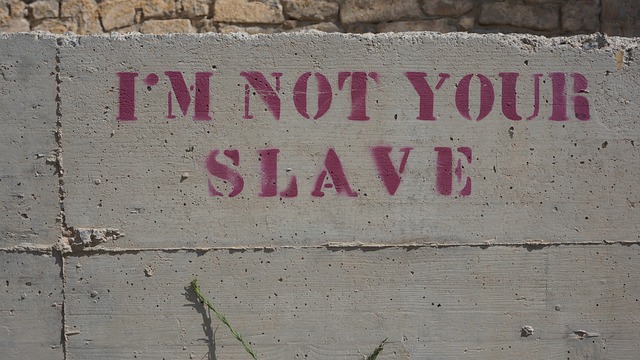In the Bible, there are several passages that address the topic of slavery. While the Bible does not explicitly condemn slavery, it does provide guidelines for how slaves should be treated and emphasizes the importance of treating all people with dignity and respect.
Table of Contents
Freedom in Christ: Understanding God’s Perspective on Slavery
Have you ever wondered what God says about slavery? It’s a topic that can be difficult to navigate, especially in today’s world where the concept of slavery is rightly seen as abhorrent. But if we look to the Bible, we can find guidance on how to understand slavery from a biblical perspective.
First and foremost, it’s important to remember that the Bible was written in a different time and culture than our own. Slavery was a common practice in the ancient world, and the Bible does address it in various passages. However, it’s crucial to interpret these passages in their historical context and not apply them directly to our modern understanding of slavery.
One key aspect of understanding God’s perspective on slavery is recognizing that all people are created in the image of God and have inherent dignity and worth. This means that no one should be treated as property or exploited for personal gain. In fact, the Bible condemns the mistreatment of slaves and calls for fair and just treatment of all people, regardless of their social status.
In the Old Testament, we see laws that regulate the treatment of slaves, such as allowing them to go free after a certain period of service or providing for their well-being. These laws were meant to protect the rights of slaves and ensure that they were not subjected to abuse or exploitation.
In the New Testament, we see a shift in how slavery is addressed. While the Bible does not explicitly condemn slavery, it does emphasize the importance of love, compassion, and equality among all believers. In his letters, the apostle Paul encourages masters to treat their slaves with kindness and fairness, and he even calls for the release of a runaway slave, Onesimus, in the book of Philemon.
Ultimately, the Bible teaches that true freedom comes from being in Christ. In Galatians 3:28, Paul writes, “There is neither Jew nor Greek, slave nor free, male nor female, for you are all one in Christ Jesus.” This verse highlights the equality and unity that believers have in Christ, regardless of their social status or background.
As Christians, we are called to follow the example of Jesus, who came to serve and not to be served. This means that we should treat others with love, respect, and dignity, regardless of their social status or circumstances. We are called to be agents of reconciliation and justice in a world that is broken and divided.
So what does God say about slaves? While the Bible does not explicitly condemn slavery, it does provide guidance on how to treat others with love, compassion, and respect. As believers, we are called to seek justice, love mercy, and walk humbly with our God. By following the example of Jesus and living out the principles of the Bible, we can work towards a world where all people are treated with dignity and equality.
Biblical Perspectives on Slavery: Examining Old and New Testament Scriptures
Have you ever wondered what the Bible says about slavery? It’s a topic that can be controversial and confusing for many people. Some may argue that the Bible condones slavery, while others believe that it condemns it. Let’s take a closer look at what the Old and New Testaments have to say about this issue.
In the Old Testament, slavery was a common practice in ancient societies. The Israelites themselves were enslaved in Egypt before being liberated by God through Moses. However, the Bible also contains laws that regulate the treatment of slaves. For example, in Exodus 21:16, it states that anyone who kidnaps a person and sells them into slavery should be put to death. This shows that God values the freedom and dignity of every individual, regardless of their social status.
Furthermore, in Leviticus 25:39-43, it is written that Israelites were not to treat their fellow Israelites as slaves, but as hired workers. They were also commanded to release their slaves in the Year of Jubilee, which occurred every 50 years. This demonstrates God’s concern for the well-being of those who were enslaved and his desire for justice and compassion in society.
Moving on to the New Testament, we see a shift in the way slavery is addressed. In his letters, the apostle Paul instructs slaves to obey their masters and work diligently, as if they were serving the Lord himself (Ephesians 6:5-8). While this may seem troubling to modern readers, it’s important to understand the context in which these instructions were given.
During the time of the early church, slavery was a widespread institution in the Roman Empire. Paul’s teachings were meant to guide believers on how to live out their faith in a society that was deeply entrenched in slavery. By encouraging slaves to serve their masters well, Paul was promoting a spirit of humility, obedience, and love, even in difficult circumstances.
However, it’s crucial to note that Paul also emphasizes the equality of all believers in Christ. In Galatians 3:28, he declares that in Christ, there is neither slave nor free, male nor female, for all are one in Christ Jesus. This radical statement challenges the social norms of the time and affirms the inherent worth and dignity of every person, regardless of their status in society.
In conclusion, the Bible presents a complex and nuanced perspective on slavery. While the Old Testament contains laws that regulate the treatment of slaves and emphasize justice and compassion, the New Testament offers guidance on how to navigate the realities of slavery in a fallen world. Ultimately, the overarching message of the Bible is one of love, justice, and equality for all people, regardless of their social standing.
As we reflect on what the Bible says about slavery, let us remember that God’s heart is always for the oppressed, the marginalized, and the downtrodden. May we seek to live out his principles of love, mercy, and justice in our own lives and strive to create a more just and equitable society for all.
The Role of Slavery in Ancient Israel: Insights from the Bible

Slavery is a topic that has been debated and discussed for centuries. Many people wonder what God’s stance is on the issue of slavery. In order to gain insight into this topic, it is important to look at the role of slavery in ancient Israel as described in the Bible.
In the Old Testament, slavery was a common practice in ancient Israel. Slaves were often captured in battle or sold into slavery due to financial hardship. However, the Bible provides guidelines for the treatment of slaves that set it apart from the harsh and oppressive practices of other ancient cultures.
One of the key principles outlined in the Bible is the idea that all people are created in the image of God. This means that every individual, regardless of their social status, is deserving of dignity and respect. In the book of Genesis, it is stated that God created man in His own image, emphasizing the inherent value and worth of every human being.
Furthermore, the Bible instructs slave owners to treat their slaves with kindness and fairness. In the book of Leviticus, it is written that slaves should not be treated harshly, but rather with compassion and understanding. This demonstrates God’s concern for the well-being of all individuals, including those who are in a position of servitude.
Additionally, the Bible provides guidelines for the release of slaves. In the book of Deuteronomy, it is stated that slaves should be set free after six years of service. This demonstrates God’s desire for freedom and justice for all individuals, even those who are in a position of bondage.
It is important to note that while the Bible does provide guidelines for the treatment of slaves, it does not explicitly condemn the practice of slavery. This has led to some controversy and debate among scholars and theologians. However, it is clear that the Bible emphasizes the importance of treating all individuals with respect and dignity, regardless of their social status.
In conclusion, the role of slavery in ancient Israel as described in the Bible provides valuable insights into God’s perspective on the issue. While the Bible does not explicitly condemn the practice of slavery, it does provide guidelines for the treatment of slaves that emphasize compassion, fairness, and justice. Ultimately, the Bible teaches us to treat all individuals with respect and dignity, recognizing the inherent value and worth of every human being.
Slavery and Justice: How Should Christians Respond?
Slavery is a topic that has been debated for centuries, with many people looking to their religious beliefs for guidance on how to approach the issue. For Christians, the Bible is often seen as the ultimate source of wisdom and truth, so it’s important to understand what God says about slavery.
In the Old Testament, slavery was a common practice in ancient societies. The Bible does not explicitly condemn slavery, but it does provide guidelines for how slaves should be treated. In Exodus 21:16, it is stated that “Whoever steals a man and sells him, and anyone found in possession of him, shall be put to death.” This verse clearly condemns the act of kidnapping and selling people into slavery.
Throughout the Old Testament, there are also laws that regulate the treatment of slaves. For example, in Leviticus 25:39-43, it is stated that Hebrew slaves should be treated as hired workers and not as property. This shows that God values the dignity and humanity of all people, even those who are in a position of servitude.
In the New Testament, the apostle Paul addresses the issue of slavery in his letter to Philemon. In this letter, Paul urges Philemon to welcome back his runaway slave, Onesimus, not as a slave but as a brother in Christ. This demonstrates the importance of treating all people with love and respect, regardless of their social status.
Overall, the Bible teaches that all people are created in the image of God and should be treated with dignity and respect. Slavery is a violation of this principle, as it reduces people to mere property and denies them their inherent worth and value.
As Christians, it is important to consider how we can respond to the issue of slavery in our modern world. While slavery may not be as prevalent today as it was in ancient times, there are still millions of people around the world who are trapped in various forms of bondage, such as human trafficking, forced labor, and debt bondage.
One way that Christians can respond to the issue of slavery is by supporting organizations that are working to combat human trafficking and modern-day slavery. These organizations provide resources and support to victims of slavery, as well as raise awareness about the issue and advocate for policy changes to address the root causes of slavery.
Another way that Christians can respond to the issue of slavery is by examining their own lives and attitudes towards others. Do we treat others with the same love and respect that we would want for ourselves? Do we speak out against injustice and oppression, even when it may be uncomfortable or unpopular?
Ultimately, as followers of Christ, we are called to seek justice and mercy for all people, especially those who are marginalized and oppressed. By understanding what God says about slavery and responding with compassion and action, we can work towards a world where all people are treated with dignity and respect, as beloved children of God.
The Christian Response to Modern-Day Slavery: Applying Biblical Principles
Slavery is a dark stain on human history, with millions of people throughout the ages being subjected to the horrors of forced labor and exploitation. While many may think of slavery as a thing of the past, the sad reality is that it still exists in various forms around the world today. As Christians, it is important for us to understand what God says about slavery and how we can apply biblical principles to combat modern-day slavery.
In the Bible, slavery is mentioned numerous times, with specific laws and regulations outlined in both the Old and New Testaments. While some may argue that the Bible condones slavery, it is important to understand the context in which these passages were written. During biblical times, slavery was a common practice, and the laws regarding slavery were meant to regulate and protect slaves rather than promote the institution itself.
One of the key principles that God emphasizes in the Bible is the inherent value and dignity of every human being. In Genesis 1:27, we are reminded that all people are created in the image of God, and as such, they deserve to be treated with respect and compassion. This fundamental truth should guide our response to modern-day slavery, as we seek to uphold the dignity and rights of those who are being exploited.
Another important aspect of God’s teachings on slavery is the concept of justice and fairness. In Leviticus 25:39-43, God instructs the Israelites to treat their slaves with kindness and to release them after a set period of time. This demonstrates God’s concern for the well-being of slaves and his desire for them to be treated fairly and justly.
As Christians, we are called to follow the example of Jesus Christ, who came to set the captives free and to bring justice to the oppressed. In Luke 4:18-19, Jesus declares that he has come to proclaim freedom for the prisoners and to release the oppressed. This should serve as a powerful reminder to us that we are called to stand up against injustice and to work towards the liberation of those who are enslaved.
One practical way that we can respond to modern-day slavery is by supporting organizations and initiatives that are working to combat human trafficking and forced labor. By raising awareness, advocating for policy changes, and providing support to survivors, we can make a tangible difference in the fight against slavery.
Additionally, we can also pray for those who are trapped in slavery, asking God to bring them comfort, strength, and ultimately, freedom. Prayer is a powerful tool that can move mountains and bring about miraculous change in the lives of those who are suffering.
In conclusion, as Christians, we are called to be a voice for the voiceless and to stand up for the oppressed. By understanding what God says about slavery and applying biblical principles to our response, we can work towards a world where all people are treated with dignity, respect, and love. Let us continue to fight against modern-day slavery and work towards a future where freedom and justice reign supreme.
Conclusion
In the Bible, God does not explicitly condemn slavery, but instead provides guidelines for how slaves should be treated. The New Testament encourages slaves to obey their masters and work diligently, while also emphasizing the importance of treating all people with love and respect. Ultimately, the Bible teaches that all individuals are equal in the eyes of God, regardless of their social status.
For licensing reasons, we must provide the following notice: This content was created in part with the help of an AI.


